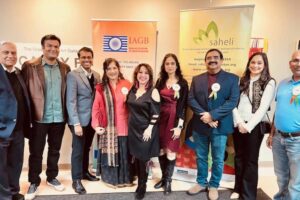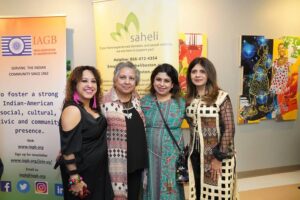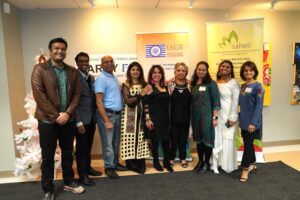January 2024
Public Announcements
IAGB Republic Day 2024:
When: 27 January, 2024 @ 12 – 7 pm
Where: Burlington High School
What: ‘Chalachitram’ – Celebrating 110 years of Indian Cinema
Sign-up: https://form.jotform.com/IagbForms/iagb-republic-day-2024-cultural-per
Entry Submission Deadline: Now extended to 3rd January, 2024
IAGB Republic Day 2024 Competitions:
As always, IAGB will be holding competitions in the following categories. Please find the description, the registration form, and entry submission deadline for each category in the given link.
- IAGB Bollywood Quiz: https://form.jotform.com/IagbForms/bollywood-quiz—iagb-republic-day-
- IAGB Chess Competition: https://form.jotform.com/IagbForms/chess-competition—iagb-republic-d
- IAGB Teeny Tiny Shark & Junior Shark Competition:
https://form.jotform.com/IagbForms/teeny-tiny-sharks–junior-sharks-co - IAGB Math Quiz:
https://form.jotform.com/IagbForms/math-quiz—iagb-republic-day-compe - IAGB Art Competition:
https://form.jotform.com/IagbForms/art-competition—iagb-republic-day - IAGB Carrom Competition:
https://form.jotform.com/IagbForms/carrom-competition—iagb-republic-
IAGB Republic Day 2024 - Vendor Booths & Ads in the e-Brochure:
Don’t miss a great opportunity to showcase your small business or nonprofit organization for a diverse and eager audience! Put an ad in our digital brochure or have a booth at the IAGB Republic Day Mela 2024!
Find all necessary information & registration link here
https://form.jotform.com/233325656200145
Advertisement: Full Page or Half Page at a great price!
Vendor Booth: Special early bird discounts till Jan. 23, 2024
From IAGB President Tanu Phoenix:
We are grateful to all our Sponsors who are making this event possible!
- Atamian Honda
- CareAccess
- ClubSciKidz
- Indian Circle for Caring (ICC)
- Russian School of Mathematics (RSM)
- 42 North Dental
IAGB expresses gratitude to its Media Partners:
- India New England News
- Lokvani
- Mera Sangeet
- TV Asia
- Gunjan Radio
Community Spotlight – Mohan Nannapaneni

Mohan Nannapaneni, the Co-Founder and CTO of Sigma Systems Inc., is a remarkable entrepreneur and philanthropist with a profound commitment to both the Indian and American communities. He has achieved extraordinary success in the business world, leading Sigma Systems Inc. to become one of the fastest-growing privately held companies in America. However, Mr. Nannapaneni’s impact extends far beyond the business realm.
In the realm of philanthropy, Mohan Nannapaneni has left an indelible mark. His contributions have led to the rebuilding of government schools in India, transforming them into thriving educational institutions. He has provided financial support to numerous students, enabling them to pursue higher education in medical and engineering colleges, including the prestigious IITs.
One of his notable contributions is the establishment of TEAM Aid, a nonprofit organization that focuses on providing assistance to individuals and families affected by catastrophic incidents such as accidents and sudden deaths. TEAM Aid has emerged as a vital resource, coordinating the transportation of deceased individuals to their respective hometowns across India and 15 other countries. It has become a leading emergency assistance provider within the immigrant community throughout North America. His advocacy skills came to the forefront when he intervened on behalf of over 2,400 students facing deportation when Tri-Valley University was closed, securing their readmission opportunities and protecting their dreams.
In addition to its role in helping families cope with the sudden loss of their loved ones, TEAM Aid, under Mohan Nannapaneni’s leadership, has also extended its support to individuals facing legal issues, especially those dealing with mental health challenges. This organization has rapidly expanded its reach, with more than 2,500 dedicated volunteers across North America and over 20 countries. On average, TEAM Aid now provides assistance to at least a dozen families per week in the USA, demonstrating its commitment to helping those in distress.
Mohan Nannapaneni’s community service efforts have touched the lives of countless individuals and families affected by disasters and emergencies, making TEAM Aid an indispensable resource in times of crisis. His dedication to community service and humanitarian work has earned him numerous service awards and recognitions from teachers’ unions, educational/cultural organizations, city councils, and NGO entities in
both India and America. Through his unwavering commitment to TEAM Aid and other charitable causes, Mr. Nannapaneni continues to make a positive and lasting impact on
communities worldwide.
IAGB Upcoming Events
IAGB Community Giving January 2024 – Sankranti Rice Collection
Our Benefactor Choice: Gurdwara Sahib, Westborough, MA
Makar Sankranti marks the onset of the harvest season in India. People harvest rice as a token of gratitude for light, warmth & life on earth. It is a Thanksgiving Day of sorts because it inculcates a sense of gratitude towards the Sun, one of the most significant sources of life on earth.
Drop Off Location:
16 Independence Ln, Ashland MA 01721
5 Jefferson Dr., Lexington, MA 02420
Drop Off between:
Jan. 1 – Jan. 29
Item to collect: Indian RICE (Basmati, Sona Masoori)
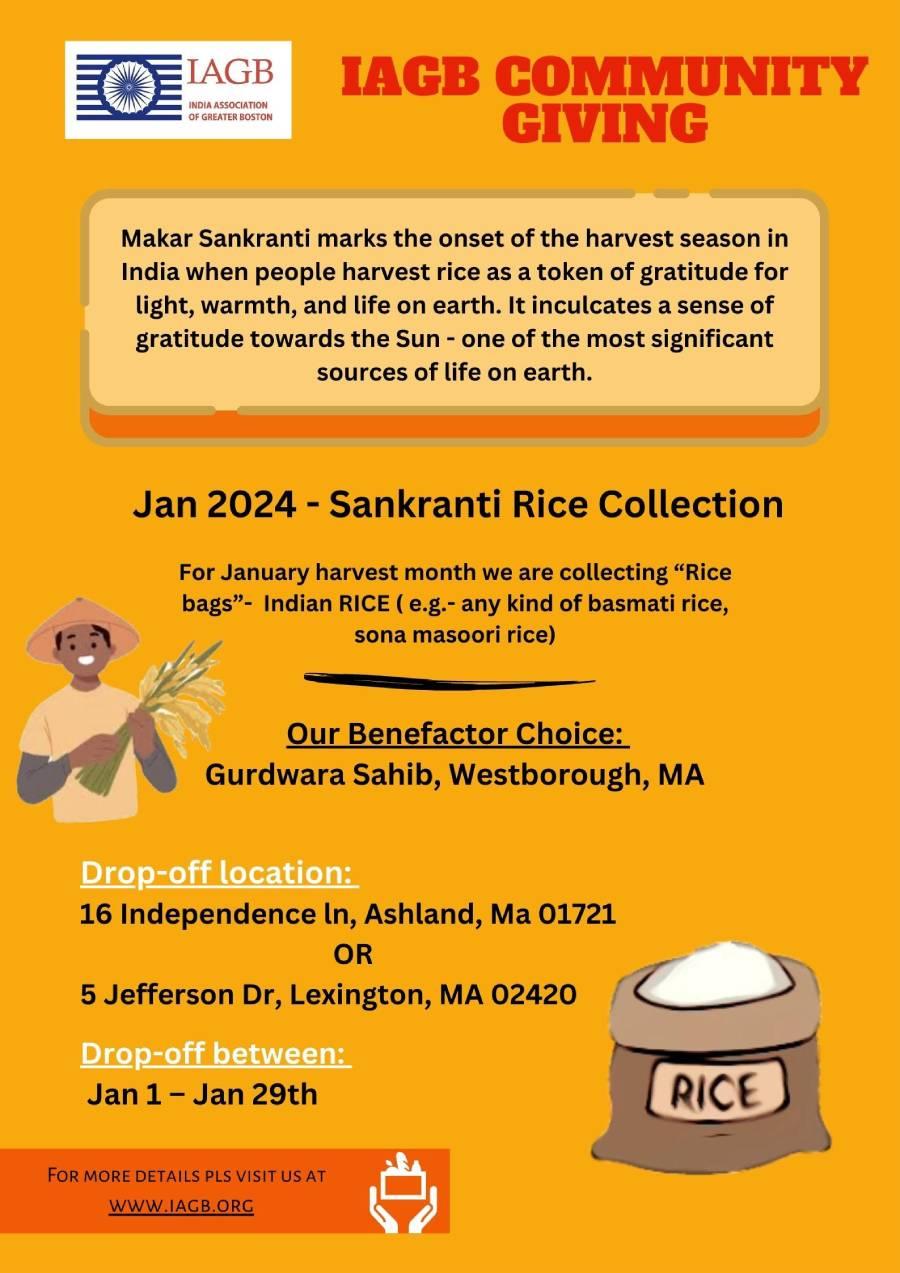
Community Conversations

Aarya Wachasunder:
“Lagaan” is my favorite movie because it tells a captivating story set in colonial India where villagers challenge British rulers to a cricket match to avoid high taxes. The characters, music by A. R. Rahman, and cinematography all contribute to the film’s charm. Beyond being a sports drama, “Lagaan” is a powerful story about unity, courage, and the triumph of the human spirit. It’s a timeless masterpiece that delivers a meaningful message about uniting against the brutality of colonialism in an entertaining way, making it a movie that I can watch repeatedly.
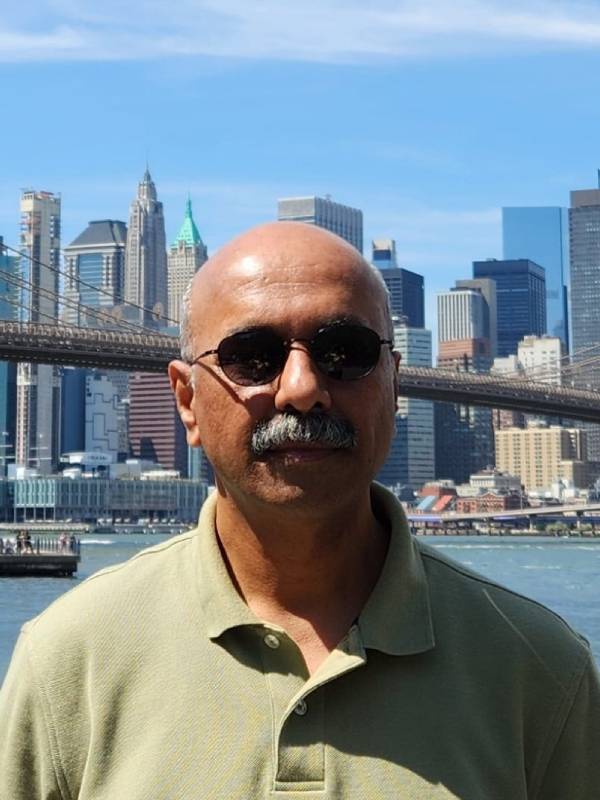
Santosh Late:
Indian movies have a genre of their own. Vibrant, colorful, larger than life caricatures and of course musical. It has been evolving like any other industry. In the recent past, it is interesting to see that they are now coming up with movies emphasizing our history and our glorious past. Sometimes, with society imitating arts, this new age attempts to bring forth our history, especially for Gen Z, is commendable.
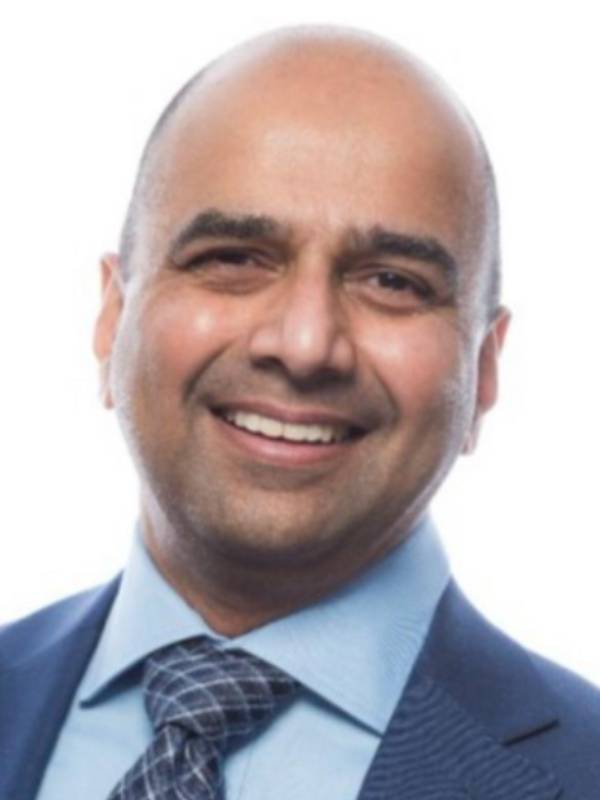
Durgesh Vaidya:
My nostalgia for watching Hindi movies with friends involves oppressive Mumbai heat while waiting outside the theater, the refreshing burst of air-conditioned air upon admission, the joy of commercials and their tag lines before the feature presentation (e.g. “Charminar Cigarettes – Nothing comes between you and the flavor, not even a filter!”, “Tiger Brand Chai – Sherdil jawaanonki pasand!, Lifebuoy Soap – Lifebuoy has jahaan, tandaroosti hain wahaan!”), and munching on delicious samosas while rushing back to your seat after the interval that always tasted exactly the same at any theater in the city. Years later, on a visit to India, I learned the reason from my brother-in-law – they are all catered through Hotel Gurukrupa in Sion, Mumbai (aptly called A1 samosas). One of my favorite movies is “Lage Raho Munnabhai”. My dream came true when during the COVID shutdown, I had the opportunity to host and interview the eminent National Award-winning actor, Mr. Dilip Prabhavalkar – who played Mahatma Gandhi in the movie. Lage Raho…I mean…Keep it up Bollywood!
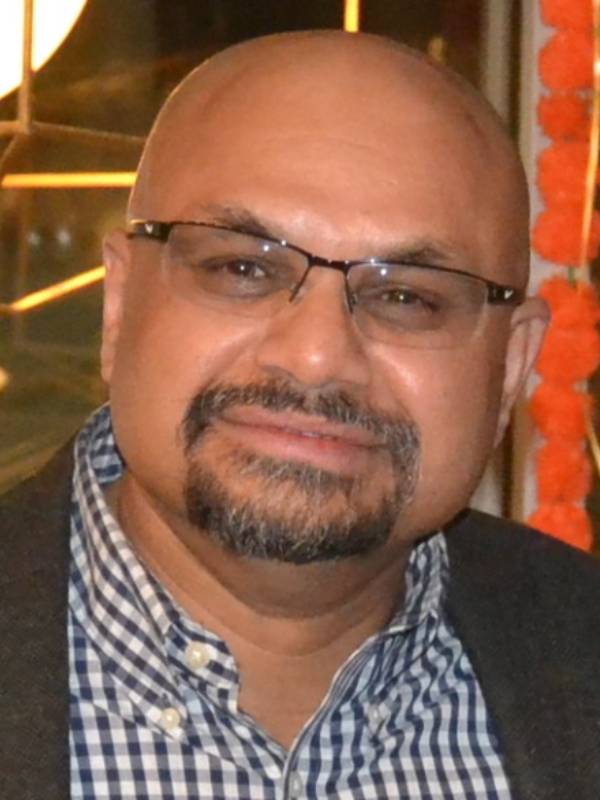
Akshay Thotangare:
Indian cinema, commonly known as Bollywood, stands as a vibrant and dynamic film industry that has made an enduring impact on the global cinematic landscape. With a history dating back to the early 20th century, Indian cinema has transformed into a multifaceted and influential cultural phenomenon. Renowned for its extravagant musical productions and the seamless integration of drama, romance, action, and music, Bollywood films capture audiences not only within India but also around the world. India boasts a diverse array of regional film industries, each contributing distinct storytelling styles and cultural nuances. Beyond mere entertainment, cinema is an integral part of life for many Indians, interwoven into the cultural tapestry of the nation. From childhood to adulthood, individuals grow up sharing the experience of watching films, fostering a sense of connection and nostalgia. The impact of cinema extends far beyond the screen, influencing fashion, language, and societal norms. Indian cinema acts as a reflective mirror, portraying societal changes, addressing critical issues, and contributing to the collective imagination of the nation. Whether portraying celebrations, exploring love and relationships, or confronting social challenges, movies serve as a mirror reflecting the intricacies of Indian life, offering both escapism and a poignant reflection of reality for millions across the country.

Chethan:
Bollywood has influenced my life like a blockbuster script. From “Dil Chahta Hai” portraying the power of friendship, “3 Idiots” urging me to chase dreams, “Dilwale Dulhania Le Jayenge” teaching me love conquers all, “Zindagi Na Milegi Dobara” inspired me to seize the moment.
When life throws lemons at you, “Apna Time Ayega” echoes louder than my morning alarm, helping me embrace life’s challenges with the swagger of a hip-hop artist.
No wonder Bollywood, with catchy tunes, entertainment, and life lessons, is connecting hearts across diverse backgrounds and geographies!
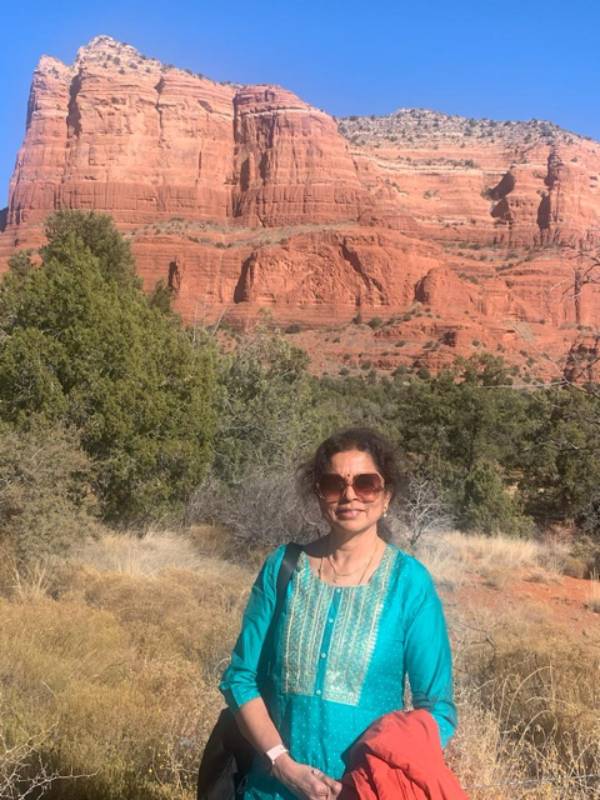
Jeyanthi Ghatraju:
My pick is the 1981 movie Silsila and my favorite song is “Dekha ek khwab”. It is said that the movie “opened up the beauty of tulips to the Indian audience!”
The yellow tulips remind us of the cheerful spring and symbolically represent charity. Tulips are supposed to be the official flowers for the 11th wedding anniversary, who knew?
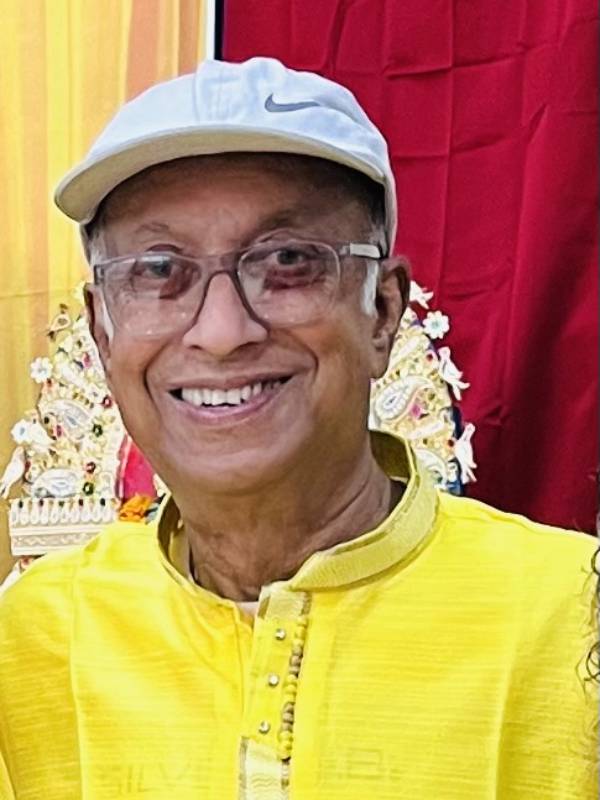
Debabrata Biswas:
I saw the Bengali classic film ‘Meghe Dhaka Tara’ (The Cloud-capped Star) scripted and directed by Ritwik Ghatak, “The Rebel” of Indian cinematography and contemporary of Satyajit Ray, when I was a young student. It was a time when every intellectual cinema lover was in awe of Satyajit Ray’s film ‘Pather Panchali’, a path-breaking film of Indian cinema. But ‘Meghe Dhaka Tara’ struck me in such a way that I still remember the entire film, shot by shot, sequence by sequence, dialogue by dialogue.
It was the first of Ghataks’ trilogy, ‘Meghe Dhaka Tara’, ‘Komolgandhar’ and ‘Subarnarekha’, depicting the deep pain, despair and tribulations of Bengal’s refugees who had to flee their ancestral homeland after the partition of India in 1947. The trilogy was women-centric and their fight for survival.
We are refugees from East Bengal; my father, an established attorney at law in pre-partition Jessore, East Bengal (East Pakistan after partition) had to flee leaving everything behind in half a day’s notice. My eldest sister who was a medical student in Calcutta at that time, had to drop out of medical school and take a job as a Junior Clerk to sustain the livelihood of our family of 10 members, consisting of our parents and eight siblings.
‘Meghe Dhaka Tara’ is a tragedy but reverberates “lust for life”. ‘Nita’, the girl who sacrifices her own love and life for the survival of her family seems so real and personal, that I could never forget it. Nita’s heart-piercing cries, “Dada ami bachte chai” (Dada, I want to live!”) still haunts me and echoes in my heart, reminding me of my eldest sister, who was like a mother to me and most of my siblings, and never lets me forget the sacrifices my “Bordi” (eldest sister) made for her family.
It took many years for Ritwik Ghatak’s classic films, including ‘Meghe Dhaka Tara’ to be widely viewed and recognized internationally. The famous French film critic, Serge Daney, held ‘Meghe Dhaka Tara’ as “one of the 5 greatest melodious melodramas in cinema’s history”. With his trilogy, Ghatak became a part of a tradition that includes films by Cukor, Sirk, Rosselini, Dreyer, Ozu and Mizoguchi.

Tonirika Das:
One of my favorite memories from an Indian movie is from “3 Idiots,” a film that seamlessly blends humor and poignant storytelling. The scene where the three friends chase their dreams against all odds resonates deeply, showcasing the power of friendship and individuality. Indian movies, exemplified by the diversity in “Dil Dhadakne Do,” “Om Shanti Om,” and “3 Idiots,” captivate audiences worldwide with their rich narratives, vibrant cinematography, and compelling characters. These films often explore societal norms, challenge stereotypes, and celebrate the triumph of the human spirit. The unique blend of entertainment, cultural depth, and emotional resonance in Indian cinema makes it a truly enriching and globally appreciated cinematic experience.
IAGB Event Recap
IAGB Community Giving – Dec. 2023
*It’s the season for giving! *
After the success of November’s Community Giving, IAGB is running a successful food drive for December. We sincerely thank our generous donors for our November Community Giving.
The holidays are a time for celebration with family and friends, but many families are struggling to provide for their basic needs. Many are dealing with financial distress and grappling with the high cost of living having to make tough decisions between buying food or paying for housing, healthcare, or transportation.
IAGB is here to help in this holiday season. Collecting items for this holiday season like Christmas cornbread, ginger bread cookies, vegetarian stuffing to make a good holiday meal.
Help make the season brighter for those who are unable to afford the tradition of a holiday meal! Please send donations now.

Sur Saheli
IAGB felt great honor and delight to have collaborated with Saheli for its unique concert “Sur Saheli”, a dance & musical evening on Saturday, Dec. 2, 2023, at Lexington Christian Academy, in Lexington, MA, supporting survivors through the vibrant fusion of Indian film, classical, and American pop music.
IAGB stands tall with Saheli in its passionate work in helping domestic violence survivors to rebuild their lives for the last 25+ years, having helped thousands of women to reclaim their lives, protect their families, and secure a brighter future.
IAGB believes in collaboration, friendship, camaraderie and peaceful coexistence with organizations within and outside the community. Saheli was founded in 1996 in collaboration with the India Association of Greater Boston (IAGB). Once a sister, always a sister – hence rekindling our old ties and sisterhood with Saheli was inevitable, an organic outcome of our long-standing orientation and relationship with Saheli.
“Sur Saheli”, the unique concert was attended by over 125 people from the community. The audience enjoyed an enchanting evening of Melody and Dance through mesmerizing performances by Pallavi Nagesha and Musical Band Taal Mel. Both stole the show and enabled this event to truly emerge as a meaningful celebration of harmony and resilience.
Pallavi Nagesha, a Bharatnatyam dancer and teacher in the Greater Boston area, presented the timeless theme of “Nayika.” Taal Mel, the musical band charmed the audience by bringing together rhythms (Taal) and harmonies (Mel) from the two rich musical cultures, Indian and Western classical and pop styles, ranging from Carnatic and Indian film music to blues and rock.
Here’s to many more such collaborations with Saheli, our lovely sister!



